Code: Section 27 of The Hindu Adoptions and Maintenance Act, 1956
“A dependant’s claim for maintenance under this Act shall not be a charge on the estate of the deceased or any portion thereof, unless one has been created by the will of the deceased, by a decree of court, by agreement between the dependant and the owner of the estate or portion, or otherwise.”
Explanation of Section 27
Section 27 of the Hindu Adoptions and Maintenance Act, 1956 clarifies an important legal principle: a dependant’s right to maintenance does not automatically become a legal charge or lien against the deceased’s estate. In other words, simply being entitled to maintenance under the Act does not grant the dependant a legal interest in or claim against the estate’s assets, unless a formal arrangement is made.
However, such a charge can arise under any of the following conditions:
- If the deceased has specified it in a valid will.
- If a competent court creates such a charge through a decree.
- If there is a mutual agreement between the dependant and the estate owner.
- If created “otherwise,” which may include statutory or customary law.
This provision works in tandem with Section 26, which prioritizes the repayment of debts over maintenance. Section 27 further restricts the enforceability of maintenance claims unless supported by legal or contractual means.
Key Points:
- A dependant’s claim is not automatically a legal charge on the estate.
- A charge must be created by:
- A will
- A court decree
- A mutual agreement
- Other legal means
- This limits the automatic enforceability of maintenance from the estate’s assets.
Illustration
Example: A man passes away, leaving behind an estate worth ₹50 lakhs. His widowed sister, who is financially dependent on him, seeks maintenance under the Act. However, there is no mention of her in the will, no court decree, and no prior agreement.
In such a case, according to Section 27, she cannot claim that the estate or any part of it is legally obligated to pay her maintenance unless one of the permitted mechanisms (e.g., court order or will) is used to create such a charge.
Common Questions and Answers on Section 27
- What is meant by “charge on the estate”?
A charge means a legal right or claim on a specific part of the property or estate that can be enforced in court. - Can a dependant automatically claim maintenance from the estate?
No, not unless a charge has been created through a will, court decree, or agreement. - Can a dependant apply to the court to create such a charge?
Yes, a dependant may approach the court for a decree that can impose a charge on the estate for maintenance. - What happens if a will contradicts a dependant’s maintenance claim?
The will usually prevails unless the dependant obtains a court order creating a charge for maintenance. - What does “otherwise” mean in this context?
“Otherwise” can include statutory provisions or customary law recognized by the courts that create a valid charge.
Conclusion
Section 27 of the Hindu Adoptions and Maintenance Act ensures that maintenance claims by dependants are not automatically enforceable against the estate of the deceased unless specifically authorized by legal mechanisms. This prevents arbitrary or implied claims and reinforces the need for clear legal documentation—either through wills, court orders, or agreements.
To better understand your rights regarding inheritance and maintenance law, visit ApniLaw.







